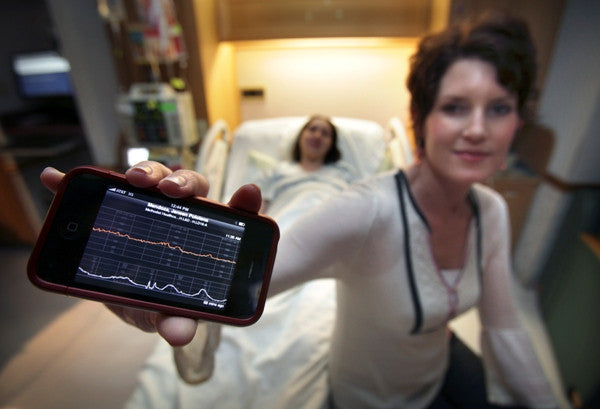An App That Really Delivers

Obstetrician Nancy Rector-Finney calls the AirStrip OB app on her Apple iPhone a revolutionary product.
Rector-Finney, who works at San Antonio's Methodist Hospital, said she no longer has to be in the hospital at a patient's bedside to track maternal contractions or fetal heart rates, nor does she have to rely on a nurse's description of the waveform data.
Now, she can receive the data on her iPhone.
“It's actually changed the way we practice medicine,” Rector-Finney raved. “It allows us to be more mobile. If there is a problem, we can be there (in the hospital). If the baby is doing great, we can be in the office seeing patients. It's awesome.”
That's fairly typical of the responses San Antonio-based AirStrip Technologies Inc. principals have heard since the app debuted four years ago.
Today, some 2,000 doctors use the AirStrip OB app. The company expects that by the end of this year, the app will be in the hands of as many as 8,000 doctors.
“Our goal is to set a new standard of care in obstetrics and remote-patient monitoring through mobility,” said Dr. Cameron Powell, an obstetrician who quit delivering babies two years ago to become AirStrip's full-time president and chief medical officer.
So far, about 200 hospitals have adopted the AirStrip OB. Hospitals, Powell said, are motivated to provide services that lessen risks.
“The reality is, 60 percent of adverse outcomes in labor and delivery are directly related to communication errors,” Powell said. “Hospitals, the deep pockets, are all about trying to improve patient outcomes.”
Powell founded AirStrip with software developer Trey Moore, the company's chief technology officer. Powell's father, Gene Powell, is chief executive of the 30-person company
When AirStrip OB hit the market in 2006, the iPhone still was months away from store shelves. The AirStrip OB works on a variety of hand-held devices, but Powell said 84 percent of new users own an iPhone.
Powell wouldn't discuss the company's pricing model, other than to say it's a subscription-based plan with hospitals paying a monthly fee for each doctor using the app. Originally, it cost about $60,000 for a hospital to install software that let the hospital's obstetric monitoring equipment communicate with doctors' hand-held devices. Doctors paid an annual subscription fee of $299.
Powell also wouldn't share any financial information on AirStrip. Asked why Powell was being so secretive, Moore quipped, “His dad will kill him.”
AirStrip OB appears to be a hit, though. Apple Inc. last year produced a short film featuring AirStrip and a few other companies that have created groundbreaking applications for the iPhone. In June, AirStrip was one of the key presenters at Apple's Worldwide Developers Conference in San Francisco. That helped generate a lot of interest in AirStrip, Powell said.
“We just so happen to have a very compelling, unique technology that applies across the entire health care spectrum,” Powell said.
AirStrip anticipates receiving Food and Drug Administration clearance this month to launch AirStrip Critical Care, another app that will allow physicians to monitor vital signs, including blood pressure, heart rate and respiratory rates whether the patient is in the emergency room, the intensive-care unit or recovery room. Like AirStrip OB, the new app will provide real-time and historical data.
AirStrip Critical Care's growth potential is greater than AirStrip OB's, given the larger number of physicians who could potentially use it, Powell said. He offered no estimates, however.
Powell expects AirStrip will benefit from the expansion of health care coverage to some 32 million uninsured Americans because it will exacerbate the problem of too many patients for too few doctors.
“That disparity is going to grow,” Powell said. “Because it's going to grow, technologies like AirStrip's can help physicians who are responsible for monitoring multiple patients.”


Comments on this post (2)
KfUhoMQzAnX
— VypiAtEomKrbHqC
IfwusUPZnbhYTE
— floVgQKIsZMLCiGv